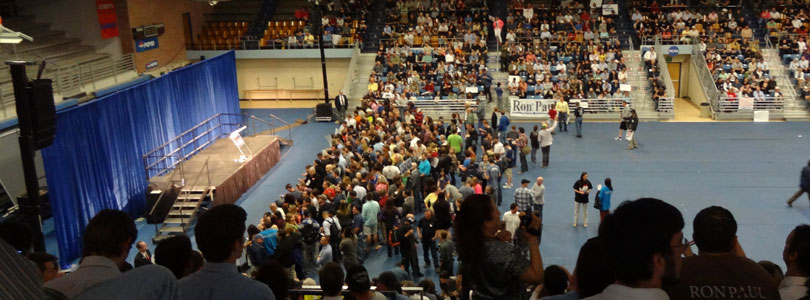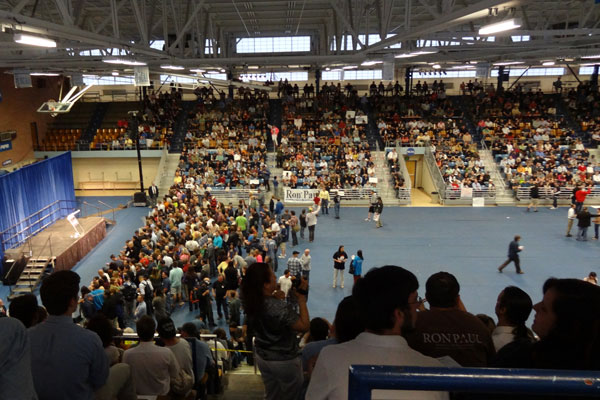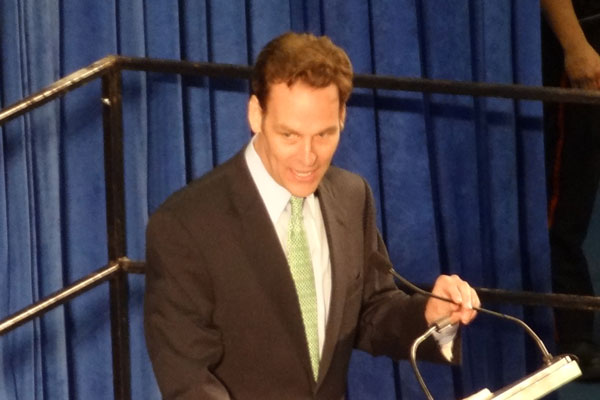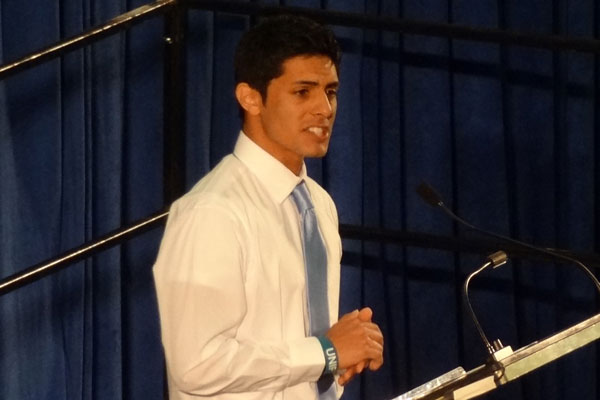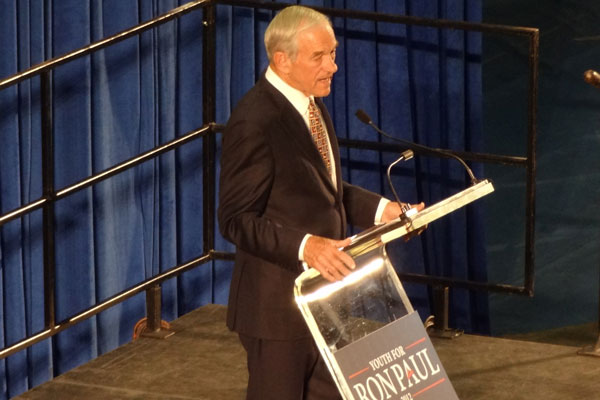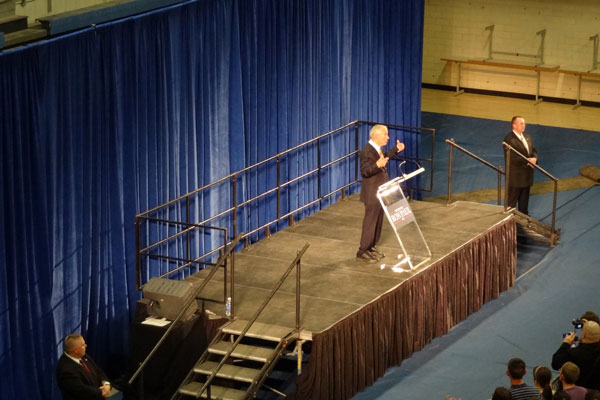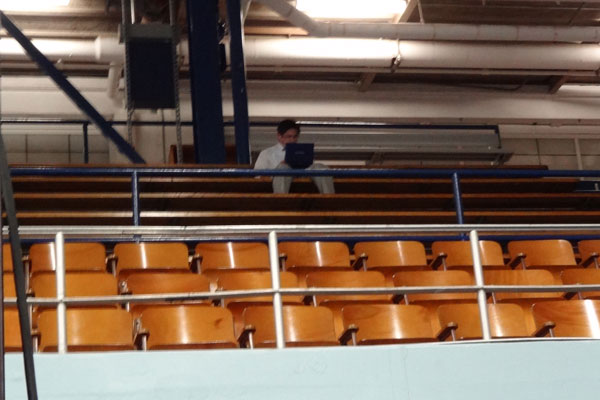04/18/12 – Ron Paul Town Hall
6:33 p.m.
There’s a long line of cars along Rt. 138 heading toward the University of Rhode Island Kingston campus. Whether they’re all en route to the Ron Paul town hall or this is ordinary rush-hour traffic, I don’t know, yet. But it does make me question the location.
7:02 p.m.
No parking. Lots of people in the gymnasium.
Republican Senate candidate Barry Hinckley is warming up the audience. It’s a very young and boisterous crowd.
Hinckley: “Rome is burning.” Politicians are “fighting over money.”
“The laughable deficit commission, the power brokers not giving an inch. What do they do? They kicked the can down the road to our children.”
Audience shouts of “Yup.” I don’t think I heard an “amen,” but that’s the feeling.
7:05 p.m.
Hinckley: “I call [Ron Paul] the founder of political honesty.”
7:06 p.m.
Emmanuel Cumplido, president of the URI chapter of Youth for Ron Paul, is up.
Cumplido: Only one candidate for president is [fiscally responsible, pro-life (?), etc.] and only that candidate can be trusted to bring our troops home.
Cumplido: Media is declaring the campaign finished. [Loud audience boos.]
7:08 p.m.
Cumplido’s relating some Ron Paul delegate victories. Audience shout: “Revolution!”
7:09 p.m.
Ron Paul ascends to the stage to loud applause.
7:10 p.m.
Paul: “Your reception is just grand.”
Introduces his wife and other family members.
Paul: “It certainly sounds like the revolution is alive and well.” “You must be so surprised that the media says we’ve disappeared.” Audience: Boooo.
Paul: “A revolution takes time, and it will change the country, and that is what we’re getting ready to do.”
7:11 p.m.
Paul: This campaign is important because it’s about ideas, and the best way to foster ideas is to win an election.
7:13 p.m.
Boos for the 16th Amendment and the Federal Reserve Act.
Paul: “We limped along for a long time” because we were so wealthy, but the golden goose is on its last legs. “How about we only send people to Washington who’ve read the Constitution and obey the Constitution?”
7:14 p.m.
Observation: One really gets a feel, from this crowd, how important an enthusiastic audience is. Sure, Paul has some different ideas than are heard from more standard politicians, but it’s the audience feedback that makes the show.
Paul: Joking, “I declined to have the Secret Service protect me.” [That made it a lot easier for this journalist to get into the venue, that’s for sure.]
7:16 p.m.
Paul: We should trade with Cuba, travel to Cuba, that is what will end the oppression, there.
7:18 p.m.
Paul: When we allow the government to protect us, we give away our liberties.
Paul: “Well over half of all prisoners are non-violent criminals. I would say we have too many laws.” This year, there have been 40,000 new laws. “I would like to be the first president ever to repeal 40,000 laws.”
7:20 p.m.
“Those laws that were passed through executive order are all illegal.” A president can repeal them.
7:20 p.m.
Paul: Obama wrote an executive order that the President can “go out and assassinate an American citizen.” “If bad people don’t get a trial, we won’t get a trial either.”
7:21 p.m.
He tied the president’s comments on the ObamaCare decision of the Supreme Court to the president’s unconstitutional executive orders.
Paul: “We need a president who will use that power to get rid of those orders.” Audience: “President Paul… President Paul… President Paul.”
Paul waited and continued talking about the Supreme Court’s strip search decision.
7:23 p.m.
Paul: “We ought to repeal the Patriot Act.”
7:24 p.m.
“Anybody standing too close to the President or protesting near him can get 10 years in prison.”
7:25 p.m.
Talks about a data center being built in Colorado. “Why do they need to know so much about us? We need to know more about them.”
7:26 p.m.
“People are coming out now because they’re realizing that we’re not a productive nation. We’re running on debt.”
“They’re not fighting over policy, in Washington… What they’re arguing about is whose friends get bailed out. Who’s going to control the shrinking pie.”
7:27 p.m.
“It’s a spending problem that comes from a philosophy problem.”
7:28 p.m.
“All nations that embark on a world empire fail” not because they’re attacked, but because of destruction of their economy.
7:29 p.m.
Paul: There’s war talk about Syria. Are we willing to talk to and work with Iran? No. We’re going to go to war with them. [That’s a paraphrase, not a quote.]
“Should we have the entitlement system?” Audience: No.
“The entitlement system doesn’t work.” Most people have “humanitarian instincts.” “The only political solution to that is to have a free society and a prosperous society.”
7:32 p.m.
“We want to take care of the poor. We don’t want anybody not to have a house.” He’s using the housing bubble to illustrate how government can’t operate on that impulse. For that purpose, government “created money out of thin air.”
Boos for Fannie Mae and Freddie Mac.
Paul: And when the bubble inevitably popped, who got bailed out?
7:33 p.m.
“The people who were supposed to be helped by the entitlement system, they lost their jobs and they lost their houses.”
“The system transfers the wealth” from the middle class to the wealthy, because the wealthy and government get to use the money first.
7:35 p.m.
He breaks the 1% into two sections: The honest people who created something, and “we made them wealthy.” “We should separate that from people who made money because they had the contacts.”
“The simple solution to this is no more bailouts.”
We need more confidence in the capitalist system. Audience boos for Keynesianism.
7:36 p.m.
He appears to be giving a history lesson about the Depression, and we need to get out of debt and get the government out of the way.
7:37 p.m.
“Liberty, for me, comes to us in a natural or God-given way. It doesn’t come from our government.”
7:38 p.m.
Paul: Businessmen who counterfeit and commit fraud go to prison. We ought to hold government accountable for doing the same.
“Our Constitution is not complex. We need a whole new generation to grow up and say, ‘The Constitution is the rule book.'”
7:40 p.m.
Paul: When we let government give us things, we forget where wealth comes from. We lose our thirst for freedom. But he says, “Freedom is still very possible.”
7:42 p.m.
I’m up in the balcony walking space and a young woman just walked by, with nose and lip piercings and a head bandana, carrying a very cute baby and followed by a pre-teen boy with dreadlocks. (It’s a white family, if you’re wondering.)
Paul: “They think that we are the past, but the people who are the past are the people who believe in tyranny.”
7:43 p.m.
“Freedom means we do make choices for ourselves, but people are always hesitant.” Some people don’t think we can take care of ourselves. [Interesting… I was listening to Matt Allen on the way over, and he was talking about how Rep. Anastasia Williams explicitly wants to make the primary-offense seat belt law permanent because she doesn’t think Rhode Islanders are behaving well enough behind the wheel.]
Paul is on to religious freedom, which gives people the right not to have religion.
Back to economics: “We shouldn’t make the assumption of moral hazard that people will take care of us if we don’t take care of ourselves.”
7:45 p.m.
“Tolerance is different from endorsing something.” If we have religious freedom without endorsing religion, we can have behavioral freedom [I’m paraphrasing] without endorsing bad behavior.
7:46 p.m.
He says politicians say all sorts of things, depending on whether they’re in office or not or whether their party is in control or not. Brings up medical marijuana as a freedom that can bring people together.
On to Prohibition. People woke up from that. “When you look at addiction as a disease rather than a crime, things would be much different.”
“I am cautiously optimistic that one day we’re going to wake up.”
7:48 p.m.
Now he’s circled around: big government is like an addiction, and “we have to quit.” “Young people, especially, are beginning to realize: what am I getting in to? I want a better deal.”
Audience: President Paul… President Paul…
The candidate waits patiently, and then, “Let me talk a little bit more about that agency called the ‘Fed.'”
7:50 p.m.
“The Fed facilitates big government” by allowing politicians to give things away without having to find the money to pay for it.
8:04 p.m.
Then he moved quickly into his coup de grace about expanding “freedom and prosperity.”
Afterwards, Paul took some questions in the stairway behind the stage, but he speaks so quietly that I couldn’t hear much of what he was saying. Of course, my ears were distracted by the state police preventing Dave Talan from standing in the press area. The police asked RI Sen. Nick Kettle whether Talan was media, and Kettle outed him as a member of the RIGOP, so out he went.
Most of the media in the stairway, though, were smaller (probably alternative) press. A correspondent from Reason magazine commented to me that he was surprised at the small media presence. I had to assure him that the Providence Journal was in the house but had to meet an early deadline. (That’s the old media for you… deadlines are like a bedtime. [Kidding, kidding.]) Here’s Philip Marcelo racing to get his article in well after the crowd has cleared.
Then folks took some pictures with the candidate, including Colleen Conley of RI Tea Party fame. Kettle answered a reporter’s question about whether he’s the only libertarian in the General Assembly with “pretty much.”
Now a small group of Paul fans are filing in to the aesthetically stark room for pictures. One came out, a young lady, shaking her friend by the shoulders, “I almost hugged him! I shook his hand.”
Other young fans are exchanging Facebook pages in order to get pictures.
As others have observed, the Paul campaign is a very interesting dynamic. One can’t help but wonder if there isn’t a way to capture this enthusiasm in a more viable candidate. (One of the Facebook exchangers just told the Reason reporter that he’d rather see Obama in office than Romney.)
Somebody recently tried to justify, to me, the arbitrary plot twists at the end of The Hunger Games by explaining that the book is for teenagers, and teenagers see the world, especially authority, as arbitrary. I wonder if something similar necessitates that “youth candidates” have at least some policy positions that seem tantalizingly unreachable, maybe even a little bit reckless, of the “why can’t we just make the world the way we want it to be” sort.
10:12 p.m. [from home]
After the event, since I haven’t been back to the URI campus since my wife graduated in 2000, I thought I’d swing by my fraternity. Not much has changed, there, although it proved to be smaller than in my memory. Somehow, I thought memory’s expansion of places only applied to those experienced during childhood, when you were, in fact, smaller yourself. But it appears that the shrinking of the world as one ages applies almost literally to everything.
The house was also in worse repair. A chunk of floor board in the main common room that had been missing when I was there is still missing, but now the ceiling tiles are down, apparently due to a leak in the showers. The composite picture from my pledge year is still in the same place, though, and a couple of brothers dutifully kept me company while I reminisced, doing an admirable job of feigning interest in the way things were back then.
They asked what the other brothers of my day are up to, now, and I had to admit that I’ve lost touch with all of them. How does a thirty-something explain to a twenty-year-old that we used to change email addresses with every job, cell phones were rare (and phone numbers mutable), and Facebook was enough years away that we had plenty of time to move, change jobs, and disappear into the world?
Beyond that, though, a man on the eve of thirty-seven has watched his world move on. He’s seen behind the curtain, to some extent, and gotten at least a glimpse of the way the world really works beyond the campus and the first job. It is more important for him to keep track of his children than his college roommate.
And so I headed home. Over the Jamestown bridge, which no longer has its predecessor shadowing its arch. Through the Newport Bridge toll booths, through which people now slow to be transponded (or whatever it’s called), rather than to throw a token into a basket and honk twice when it bounces out. Down the streets that I’ve spent the better part of the last decade traversing as a carpenter. Past my children’s school.
Vaguely, I felt there to be something important in the confluence of experiences. Here the distance between the alumnus and his counterparts nearly two generations removed. There the distance between the quirky candidate, nearly eighty years old, and his boisterous, youthful audience.
In one of those coincidences that makes a writer trust in messages from beyond, the classical radio station was playing the “revised” version of Mendelssohn’s Symphony No. 4, “Italian.” The original is by far preferred, almost universally, but the composer couldn’t stop himself from tinkering.
Experience, it would seem, should not always write over the enthusiasm of youth and first productions. But that’s a matter of balance. Experience must temper exuberance, notwithstanding a tendency to overcompensate.
Upon reflection, it seems to me that one reason the fraternity house seemed so small was that all of the bedroom doors (and I mean all) were closed. That was never the case during my time in residence. Perhaps it just happened to be that way, tonight. Or perhaps there was something in the world that my generation, and those that came before, experienced that has slipped away.
I’m grasping, here, for a lesson, a nice clincher that would finally allow me to stamp the essay “done.” We’re in uncertain times, though, and what must be learned from experience and what must be learned from exuberance is not by any means clear.
11:18 p.m.
By the way: The dockworker overalls and boots that I forgot in the boiler room when I moved out of the house (and found an office job on campus) in 1998 are no longer there. And I got the impression that the hazing of pledges is not what it once was.
Those two observations are probably not related.

